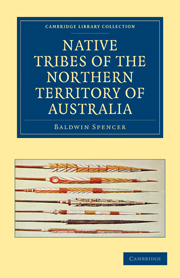Book contents
- Frontmatter
- Preface
- NOTE
- Contents
- LIST OF ILLUSTRATIONS
- CHAPTER I INTRODUCTION
- CHAPTER II SOCIAL ORGANISATION AND MARRIAGE REGULATIONS
- CHAPTER III INITIATION CEREMONIES
- CHAPTER IV TOTEMIC SYSTEMS AND TOTEM GROUPS
- CHAPTER V SACRED STICKS, BULL-ROARERS, AND CEREMONIAL OBJECTS
- CHAPTER VI BURIAL AND MOURNING CEREMONIES
- CHAPTER VII MAGIC AND MEDICINE
- CHAPTER VIII BELIEFS IN REGARD TO THE ORIGIN OF CHILDREN
- CHAPTER IX TRADITIONS CONCERNING IMBEROMBERA, THE GREAT ANCESTOR, AND ALSO OTHER ANCESTORS OF THE KAKADU NATION
- CHAPTER X VARIOUS TRADITIONS, CUSTOMS, AND BELIEFS
- CHAPTER XI FOOD RESTRICTIONS
- CHAPTER XII WEAPONS AND IMPLEMENTS
- CHAPTER XIII CLOTHING AND ORNAMENT
- CHAPTER XIV DECORATIVE ART
- APPENDIX
- GLOSSARY OF NATIVE TERMS
- INDEX
- Plate section
- Plate section
CHAPTER V - SACRED STICKS, BULL-ROARERS, AND CEREMONIAL OBJECTS
Published online by Cambridge University Press: 05 July 2011
- Frontmatter
- Preface
- NOTE
- Contents
- LIST OF ILLUSTRATIONS
- CHAPTER I INTRODUCTION
- CHAPTER II SOCIAL ORGANISATION AND MARRIAGE REGULATIONS
- CHAPTER III INITIATION CEREMONIES
- CHAPTER IV TOTEMIC SYSTEMS AND TOTEM GROUPS
- CHAPTER V SACRED STICKS, BULL-ROARERS, AND CEREMONIAL OBJECTS
- CHAPTER VI BURIAL AND MOURNING CEREMONIES
- CHAPTER VII MAGIC AND MEDICINE
- CHAPTER VIII BELIEFS IN REGARD TO THE ORIGIN OF CHILDREN
- CHAPTER IX TRADITIONS CONCERNING IMBEROMBERA, THE GREAT ANCESTOR, AND ALSO OTHER ANCESTORS OF THE KAKADU NATION
- CHAPTER X VARIOUS TRADITIONS, CUSTOMS, AND BELIEFS
- CHAPTER XI FOOD RESTRICTIONS
- CHAPTER XII WEAPONS AND IMPLEMENTS
- CHAPTER XIII CLOTHING AND ORNAMENT
- CHAPTER XIV DECORATIVE ART
- APPENDIX
- GLOSSARY OF NATIVE TERMS
- INDEX
- Plate section
- Plate section
Summary
One of the most striking features in regard to the sacred and totemic ceremonies of the Northern, as compared with the Central, tribes is the comparative absence of the equivalents of the Churinga and such ceremonial objects as Nurtunjas and Waningas that form so striking a feature of the Arunta tribe. It is, of course, possible that such, or their equivalents, exist, indeed, the Kakadu and allied tribes have an extensive series of sacred stick and stones, but these are not used during ordinary totemic ceremonies in the same way in which the Churinga are amongst the Arunta, nor have they the same significance as the Churinga.
So far as I could discover there are no bull-roarers used amongst the Melville and Bathurst Island natives, nor on the mainland amongst the following tribes:—Koarnbut, Quiradara, Norweilemil, Punuurlu, Kumertuo, Geimbio, Noalanji and Kakadu. These form a large group of allied tribes inhabiting the Coburg Peninsula and the north coast drained by the Alligator Rivers, the King, and the Liverpool, etc.
At all events, as we pass from the centre to the north, the beliefs with regard to the sacred sticks and stones have a decided tendency to become simpler, and in none of the northern tribes does there appear to be any tradition with regard to the association of any particular bull-roarer with a special ancestor. Nor do we meet with anything corresponding to the Ertnatulunga or sacred storing places in which the Arunta preserve their Churinga.
- Type
- Chapter
- Information
- Native Tribes of the Northern Territory of Australia , pp. 210 - 227Publisher: Cambridge University PressPrint publication year: 2010First published in: 1914



